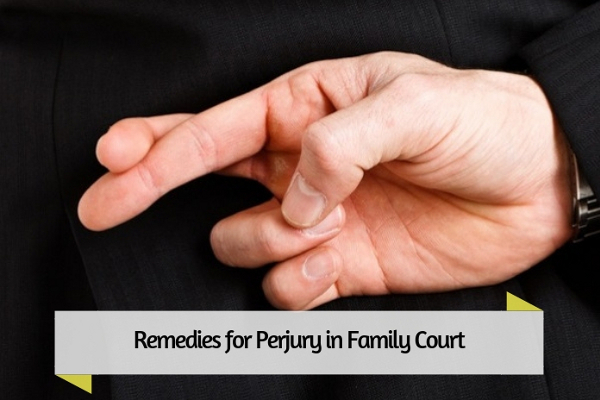If you have been to a family court session you know emotions can run high. This is partly because of the nature of cases presided over in this court, such as divorce, custody, foster care or succession. Some people will even lie to get custody of children, property, child support or a quick divorce. It is not strange to see people lie about income, assets and fabricate cases of child abuse and domestic violence just to win their case. Lying to influence a case in your favor is illegal.
You can get more information about law at bail bonds.


What is Perjury?
Perjury is a civil offence that involves lying in court under oath. Perjury can happen in any hearing, but it’s more common in family courts. Perjury can take many forms. A former partner or the other parent can lie about retirement accounts during a divorce case or where a child currently lives. It can also involve fabricating domestic abuse to bring false accusations. They can also lie about the existence of documents that are relevant to the ruling. Other parents lie about the involvement (or lack of it) with a child or honoring visitation orders when indeed the visitation has been denied. Falsifying income levels in order to pay less alimony or child support is also perjury. Other people will go as far as forging letters and documents to defend their case or malign the other parent or partner.
Why is Perjury so Common in Family Courts?
People have openly wondered why perjury is almost permissible in family court. Most attorneys will tell you that it is very rare to find a case that is black and white in a family court. There are so many grey areas in these family cases that people tend to take advantage of, including attorneys.
Although this could vary from one person to another, there are three reasons that perjury is prevalent in family court. First, family is civil, so the approach to civil issues is not as straightforward as criminal. Second, establishing proof may require a lot of time. Prosecutors are already overwhelmed by numerous cases and therefore pursuing a case of perjury is rarely a priority. Third, there is a huge proof problem with perjury cases. Remember that this is a person that had intent to lie. Obviously, they have gone to great lengths to falsify documents or avail witnesses in favor of their case.
Is it Punishable by Law?
Perjury is a complicated legal issue, as you can see. Many people have blamed the family court for lacking mechanisms to address this breach of law. Often, people believe there is nothing that can be done in a family court when perjury has taken place. Perjury is primarily is a criminal offense. However, to get justice, the judge must take interest in the case. There are very few incidences where people have been charged with perjury in a family court.
Perjury in family courts cannot be ignored any further because of the damage it brings to the children or the aggrieved parties later in life. Imagine a scenario where an abusive parent commits perjury and succeeds to get custody of the children. In another instance, think of a situation where a partner fabricates cases of domestic abuse and financial neglect and succeeds in ruining the financial situation and wellbeing of the former partner. When we look at it this way, there is a need to have well-structured ways of investigating and punishing perjury.
We are beginning to see cases where people are being prosecuted for perjury in family court. In December 2017, a Lincoln woman was charged with perjury by the Lake County District Attorney. In 2015, the woman had denied under oath that her current boyfriend was violent and an alcoholic, thus threatening the safety of the child. She denied these allegations by her ex-husband in order to get custody of their child. Sadly, Lake County seems to be the only court with a perjury unit in the United States.
What Remedies are There for the Offended Party?
The problem with perjury is that the heavy burden of proof lies with the injured party or prosecution. It is up to the complainant, the child officer, or the prosecutor to prove beyond any reasonable doubt that the other party lied under oath. Sometimes it is impossible to establish these facts unless there is adequate support of the court system. It is also not possible to file a case of libel or slander against a partner that has lied against you because they are protected by Torts when providing judicial witness. However, there are other legal ways that you can get justice after becoming a victim of perjury in family court.
• Proof of contempt of court: One can be charged with an attempt to give false testimony or mislead a court which becomes an offence in both family and criminal court. If you can provide proof of the lies, you can ask your attorney to consider taking this option.
• Provide testimony or cross examination: If you have a witness that can prove that the information being presented by the other party is false, you can bring them in as part of the hearing. It could be a doctor, probation officer, neighbor or even a teacher. You can also cross-examine the person committing perjury in court. It may give you a chance to bring out the truth when he or she contradicts themselves.
• Provide proof: Remember the burden of proof for perjury lies with the injured party. Prepare well for the case alongside your Attorney. Even when you are not expecting the person to lie, be prepared with the right documents and information that may help the judges in fair hearing.
Perjury in family court is prevalent. Unfortunately, there are no proper legal guidelines on how to get damages for the aggrieved party or to punish offenders. You cannot sue someone for perjury in a family court. There is hope that most states will emulate the example of Lake County and establish a perjury unit with ability to prosecute offenders.
























